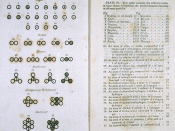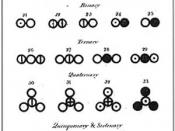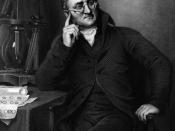Dalton, John (b. Sept. 6, 1766, Eaglesfield, Cumberland. Eng.- d. July 27, 1844, Manchester), British chemist and physicist who developed the atomic theory of matter and hence is known as one of the fathers of modern physical science.
Dalton was the son of a Quaker weaver. When only 12 he took charge of a Quaker school in Cumberland and two years later taught with his brother at a school in Kendal, where he was to remain for 12 years. He then became a teacher of mathematics and natural philosophy at New College in Manchester, a college established by the Presbyterians to give a first-class education to both layman and candidates for the ministry, the doors of Cambridge and Oxford being open at that time only to members of the Church of England. He resigned this position in 1800 to become secretary of the Manchester Literary and Philosophical Society and served as a public and private teacher of mathematics and chemistry.
In 1817 he became president of the Philosophical Society, an honorary office that he held until his death
In the early days of his teaching, Dalton's way of life was influenced by a wealthy Quaker, a capable meteorologist and instrument maker, who interested him in the problems of mathematics and meteorology. His first scientific work, which he began in 1787 and continued until the end of his life, was to keep a diary - which was ultimately to contain 200,000 entries - of meteorological observations recording the changeable climate of the lake district in which he lived. In 1793 Dalton published Meteorological Observations and Essays. He then became interested in preparing collections of botanical and insect species. Stimulated by a spectacular aurora display in 1788, he began observations about aurora phenomena - luminous, sometimes colored displays in the sky caused...


